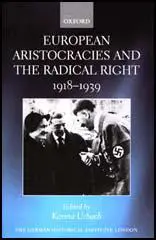Spartacus Review
Volume 6: 15th November, 2007
20th Century History

Title: European Aristocracies and the Radical Right, 1918-1939
Author: Karina Urbach
Editor:
Publisher: Oxford University Press
Price: £60.00
Bookshop: Amazon
Spartacus Website: The Right Club
Category:
This volume brings together the most recent research on European aristocracies in the first half of the twentieth century. An international array of social and political historians analyses the aristocracies of eleven countries at a particularly testing time: the interwar years. After the First World War aristocrats were confronted with revolutions, republics, and an influx of 'Bolshevist' ideas. Debates about a new order in which aristocrats would play a leading part took place in all countries after 1918. The Mussolini model, in particular, seemed an ideal solution and had an impact on aristocrats all over Europe. Here the exchange of ideas between networks of related aristocratic families played a part in spreading pro-fascist ideas. Anti-Semitism, anti-Bolshevism, and a belief in charismatic leadership also led to admiration of leaders such as Horthy and Franco. In all countries radical right-wing movements tried to recruit aristocrats as symbolic if not strategic figureheads. Is it possible, therefore, to speak of a last flourishing of the aristocracy in countries where fascist or authoritarian regimes were successful? Or are we falling for a left-wing conspiracy theory by overestimating the aristocracy's political prowess and failing to see that they often stood as a conservative bulwark against the radical right? The book shows that if radical right-wing parties could not offer new avenues to power centres, aristocrats, despite a natural predisposition, were not tempted to join, or soon lost interest. Yet their flirtations and short-term entanglements with these movements show that they played a destructive role in the great crisis years of parliamentarism.

Title: Weimar Germany: Promise and Tragedy
Author: Eric D. Weitz
Editor:
Publisher: Princeton University Press
Price: £17.95
Bookshop: Amazon
Spartacus Website: Weimar Republic
Category:
Weimar Germany still fascinates us, and now this complex and remarkably creative period and place has the history it deserves. Eric Weitz's new book reveals the Weimar era as a time of strikingly progressive achievements - and even greater promise. With a rich thematic narrative and detailed portraits of some of Weimar's greatest figures, this comprehensive history recaptures the excitement and drama as it unfolded, viewing Weimar in its own right - and not as a mere prelude to the Nazi era. "Weimar Germany" tells how Germans rose from the defeat of World War I and the turbulence of revolution to forge democratic institutions and make Berlin a world capital of avant-garde art. Setting the stage for this story, Weitz takes the reader on a walking tour of Berlin to see and feel what life was like there in the 1920s, when modernity and the modern city - with its bright lights, cinemas, "new women," cabarets, and sleek department stores - were new. We learn how Germans enjoyed better working conditions and new social benefits and listened to the utopian prophets of everything from radical socialism to communal housing to nudism. "Weimar Germany" also explores the period's revolutionary cultural creativity, from the new architecture of Erich Mendelsohn, Bruno Taut, and Walter Gropius to Hannah Hoch's photomontages and Bertolt Brecht and Kurt Weill's theater. Other chapters assess the period's turbulent politics and economy, and the recipes for fulfilling sex lives propounded by new "sexologists." Yet "Weimar Germany" also shows how entrenched elites continually challenged Weimar's achievements and ultimately joined with a new radical Right led by the Nazis to form a coalition that destroyed the republic. Thoroughly up-to-date, skillfully written, and strikingly illustrated, "Weimar Germany" brings to life as never before an era of creativity unmatched in the twentieth century-one whose influence and inspiration we still feel today.
